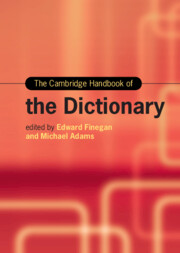Book contents
- The Cambridge Handbook of the Dictionary
- Cambridge Handbooks in Language and Linguistics
- The Cambridge Handbook of the Dictionary
- Copyright page
- Contents
- Figures
- Tables
- Contributors
- Acknowledgments
- Introduction
- Part I Types of Dictionaries
- Part II Dictionaries as Books
- Part III Dictionaries and Ideology
- Chapter 14 Dictionaries, Language Ideologies, and Language Attitudes
- Chapter 15 Dictionaries and Cultural Politics
- Chapter 16 Usage in Dictionaries and Dictionaries of Usage
- Chapter 17 Dictionaries and Language Contact
- Chapter 18 Dictionaries in Religious History and Biblical Interpretation
- Chapter 19 Attitudes Toward “The Dictionary”
- Part IV Dictionaries and Domains of Use
- Part V The Business of Dictionaries
- Part VI The Future of Dictionaries
- References: Dictionaries
- References: Secondary Works
- Index
Chapter 14 - Dictionaries, Language Ideologies, and Language Attitudes
from Part III - Dictionaries and Ideology
Published online by Cambridge University Press: 19 October 2024
- The Cambridge Handbook of the Dictionary
- Cambridge Handbooks in Language and Linguistics
- The Cambridge Handbook of the Dictionary
- Copyright page
- Contents
- Figures
- Tables
- Contributors
- Acknowledgments
- Introduction
- Part I Types of Dictionaries
- Part II Dictionaries as Books
- Part III Dictionaries and Ideology
- Chapter 14 Dictionaries, Language Ideologies, and Language Attitudes
- Chapter 15 Dictionaries and Cultural Politics
- Chapter 16 Usage in Dictionaries and Dictionaries of Usage
- Chapter 17 Dictionaries and Language Contact
- Chapter 18 Dictionaries in Religious History and Biblical Interpretation
- Chapter 19 Attitudes Toward “The Dictionary”
- Part IV Dictionaries and Domains of Use
- Part V The Business of Dictionaries
- Part VI The Future of Dictionaries
- References: Dictionaries
- References: Secondary Works
- Index
Summary
Throughout their history, dictionaries have been understood as sources of authority, whether that authority has been claimed by their makers or imputed by their audiences. In English-language contexts, that authority has taken various guises – moral, colonial, and legal, among others. Such authority rests, in part, on the linking of words, word forms, and grammatical structures to judgments about speakers, communities, and social relations. While those judgments have largely been aligned with codifying and maintaining a perceived “standard,” dictionaries have been sites of resistance, too. This chapter explores both assertions of authority and resistance. Given the long history of dictionaries and their substantial variety, the chapter adopts a case-study-like approach. It uses examples to explore how dictionaries have on the one hand upheld the civic, cultural, and social order, and on the other celebrated the linguistic practices and lexical innovations of marginalized communities and stigmatized varieties.
Keywords
- Type
- Chapter
- Information
- The Cambridge Handbook of the Dictionary , pp. 277 - 300Publisher: Cambridge University PressPrint publication year: 2024

